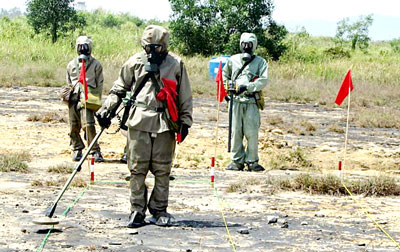Hard to clear post-war bombs and mines
VGP - Bombs, mines and explosives remained after wars are an acute problem in Vietnam and an annual peril to many residents.
 |
Vietnam has detected, collected, handled millions of bombs, mines and explosives of all types and cleared hundred thousands of land hectares, contributing to surmounting war aftermath, ensuring safe environment and conditions for the production and life of residents, diminishing accidents and wound caused by post-war bombs and mines.
Although the war has gone by for tens of years, hundred thousands of bombs and mines remain in many places, accounting for over 20% of the area of the country. Post-war bombs and mines remain in all the provinces and cities with hundreds of various types.
According to inadequate statistics, 42,132 people died and 62,163 people injured due to post-war bombs and mines. In average, 1,535 people are killed and 2,272 were severely injured each year.
Currently, about 350 to 800 thousand tons of bombs and mines remain, including high explosive bombs, shrapnel bombs, penetration bombs, missiles, mines, cannon warheads and other explosives.
Bombs and mines still cause many difficulties for the production and life of residents, hindering the socioeconomic development. The remaining bombs and mines also cause deaths and losses to the residents and a burden to the society.
From the requirements of the practice, the Prime Minister has issued the Decision 504/QD-TTg on National Action Program for surmounting the aftermath of post-war bombs and mines during 2010-2025 to mobilize foreign and domestic resources, diminish and strive to entirely surmount the aftermath of bomb and mines.
The program specifies that “the missions for the coming time are extremely tough. Along with mobilizing to the maximum, Vietnamese Government always highly appreciates and hopes to continue receiving the precious cooperation, support and contribution of the international community to help the country surmount post-war bombs and mines.”
The detection and disposal of post-war bombs, mines and explosives in Vietnam is facing many difficulties and challenges. For example, most of the areas polluted by bombs and mines have complex terrain and geology, hydrology; explosives lie in various depths with many magnetized objects.
The detection and disposal of post-war bombs, mines in Vietnam mainly uses personal equipment because the terrain is not appropriate to the mechanical method of detection and disposal, leading to the fact that the efficiency is not high. Besides, equipment for detecting and dealing with bombs and mines is insufficient and ineffective.
From the requirements of the practice, the National Action Program for surmounting the aftermath of post-war bombs and mines will create favorable conditions to strongly mobilize all resources to push the progress of detection and disposal of post-war bombs and mines, support victims of post-war bombs and mines to integrate with the society.
Specific tasks are also proposed in the two periods of 2010 – 2015 and 2016 – 2025: Complete the investigation, survey and mapping of bomb and mine pollution across the country; provide education on prevention of bomb and mine accidents for residents living in areas which are highly polluted by bombs and mines.
Continue to carry out the detection and disposal of post-war bombs and mines, serving the tasks of socioeconomic development and ensuring the safety for the people, with the area of up to 800,000 hectares; continue to implement projects of supporting victims, resettlement for people in highly polluted areas by bombs and mines.
As planned, the Action Program will be divided into 6 projects which are assigned to relevant ministries and branches. Of which, the Project of supporting victims of post-war bombs and mines to integrate with the society during 2012-2015 by Ministry of Labor, War Invalids and Social Affairs attaches special attention with the scheduled expenditure of up to VND 1,028 billion.
By Ngoc Van

